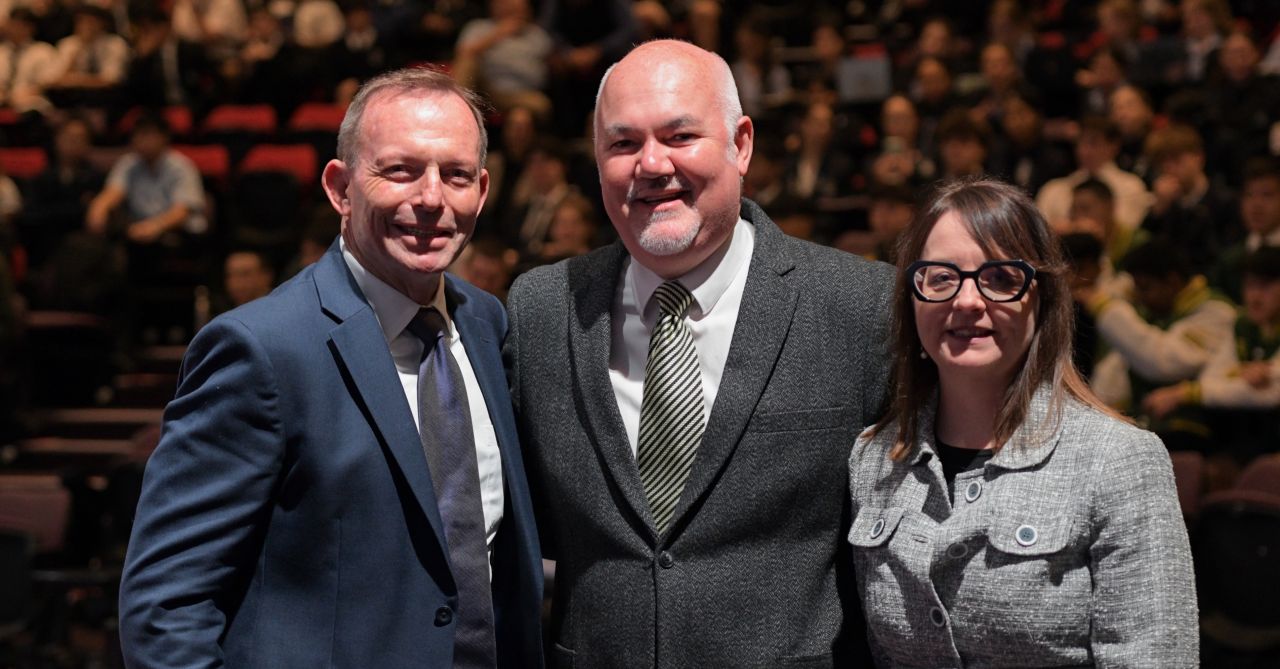Studying economics has never felt more relevant
Macquarie University welcomed 500 Year 12 students for the 2025 Echo Economics Conference earlier this month.

Attendees received critical insights alongside diverse (and at times, conflicting) approaches to Australia's macroeconomic prosperity, featuring keynotes from a former prime minister, a legendary journalist, the chair of 'The Superpower Institute' and a trailblazing economist hailing from regional Australia.
The event was a joint initiative of Macquarie Business School and Echo, a not-for-profit organisation that democratises economic literacy. Vital real-world insights were shared with students on the state of international trade, the rise and fall of inflation and interest rates, the political and environmental implications of climate change, public health crises, and the Trump Administration.
Students from partner schools filled a packed Macquarie Theatre to hear from speakers including former prime minister The Hon. Tony Abbott AC. Mr Abbott, who studied economic policy at university, said he wished that he had studied economic history. "Good economics is what makes a civilisation or nation successful. We should focus on the best of what's been said and done," he told students. “Immerse yourself in economic history as well as theory.”
Rod Sims AO, economist and former chair of the Australian Competition and Consumer Commission (ACCC), shared his expert account of Donald Trump's "deeply flawed" economic policy, in particular the focus on cutting government spending when the United States has one of the lower government spends in the OECD.
"I know [Trump appointee] Mr Musk is going around with his chainsaw, but all they're really destroying is governments, not government deficits,” Mr Sims said. “If you want to run a successful economy, just do the opposite of everything Trump is doing.”
Third to speak was Ross Gittins, economics editor of The Sydney Morning Herald, who unpacked the economic, social and political influences from the period immediately after Covid-19 that are behind the current "cost of living crisis" in Australia.
Speaking just one day before the Australian Federal Election, Mr Gittins shared that no matter which political party was voted in, the policies shared during their respective campaigns would make little difference to the management of the Australian economy.
"This is mainly done by influencing interest rates via monetary policy, not fiscal policy. That's run by the Reserve Bank of Australia (RBA) and is independent of elected government," said Mr Gittins. He praised the Reserve’s successful approach to lowering sky-high inflation rates after the pandemic, which successfully supported a levelling out of supply and demand without driving a big increase in unemployment.
While Mr Abbott had expressed his opinion that climate change was a result of normal fluctuations in nature and therefore not a "moral imperative" for society to act on, Mr Gittins respectfully rebutted that it was a "scientific imperative", but stressed that the only way to truly change behaviour was to put a price on the damage being done to the environment, often referred to as a carbon price.
Mr Gittins also said that President Trump's new 10 per cent rise in trading tariffs for Australia would not have a dire impact on our economy, however we may feel an indirect effect of a weaker Chinese economy, given China is one of our major trading partners. "About three quarters of what we produce in Australia is sold in Australia... Similarly, three quarters of what we buy is Australia made... so we shouldn't exaggerate the situation," Mr Gittins said.
The final speaker was the unflappable Michelle Wright, deputy head of communications at the RBA. Ms Wright shared her journey as a school student from regional NSW who pursued a career in economics, "Not because it's about money, but because it's about equality and access". Her career as an economist has taken her around the world and she commended the profession as "one that spans everyone in society, so it opens a lot of doors".
Ms Wright also unpacked her RBA role, which is focused on communication in support of financial literacy, and how to empower ordinary people to make good economic decisions.